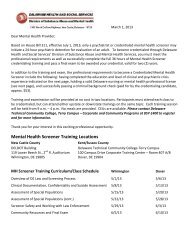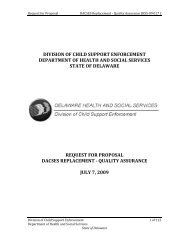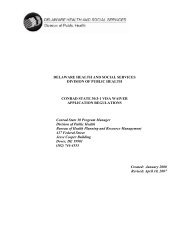D18233 GACHA Annual Report.qxd - Delaware Health and Social ...
D18233 GACHA Annual Report.qxd - Delaware Health and Social ...
D18233 GACHA Annual Report.qxd - Delaware Health and Social ...
You also want an ePaper? Increase the reach of your titles
YUMPU automatically turns print PDFs into web optimized ePapers that Google loves.
<strong>GACHA</strong> 2007 <strong>Annual</strong> <strong>Report</strong><br />
<strong>Social</strong> Justice Committee<br />
Committee Chair: Margaret Reyes<br />
11<br />
The <strong>Social</strong> Justice Committee was formed in 2004 to tackle a variety of issues<br />
of importance to Hispanic <strong>Delaware</strong>ans related to inequality <strong>and</strong> disparity<br />
between Hispanics <strong>and</strong> other populations.<br />
As in previous years, the <strong>Social</strong> Justice Committee evaluated how it could<br />
assist the State of <strong>Delaware</strong> to achieve cultural competence. Two ongoing<br />
issues continued to surface in 2007 as a result of this work:<br />
• The ongoing immigration debate at the Federal level <strong>and</strong> how this<br />
will affect the State of <strong>Delaware</strong> <strong>and</strong> the social as well as fiscal impact on<br />
the infrastructure of state government.<br />
• Limited English Proficiency (LEP) Compliance. This is a Federal<br />
m<strong>and</strong>ate written into the Civil Rights Act of 1964, Title VI, as well as being<br />
substantiated further by Executive Order 13166.<br />
Immigration Reform<br />
In 2007, there has been continued failure on the part of the U.S. Congress to pass immigration reform law, leaving millions of people to<br />
contend with living <strong>and</strong> working in the shadows of American society. American business owners have to deal with unpicked harvests <strong>and</strong> a<br />
lack of workers in the agricultural, construction, <strong>and</strong> healthcare industries. These industries are falling short of workers <strong>and</strong> the current visa<br />
programs are not generous enough in their quota of temporary workers to sustain the dem<strong>and</strong> for foreign workers. In 2007 alone, there<br />
were at least 1,562 pieces of legislation introduced among the 50 state legislatures that dealt with immigration- <strong>and</strong> immigrant-related issues,<br />
covering health, education, IDs <strong>and</strong> driver’s licenses, employment, <strong>and</strong> public benefits. Of these, 244 became law in 46 states; 11 were vetoed<br />
by governors; <strong>and</strong> two are pending governor’s review.<br />
<strong>Delaware</strong> is suffering from this failure. What is happening on the national level touches us here in <strong>Delaware</strong>. Our industrial <strong>and</strong> economic<br />
survival in many areas is dependent on the visa programs. Immigrant workers are vital to <strong>Delaware</strong>’s economic health <strong>and</strong> development, as<br />
evidenced by the explosive growth in Hispanic-owned businesses. Unfortunately, many towns <strong>and</strong> municipalities around the nation are not<br />
cognizant of this. They prefer to focus on anti-immigrant legislation <strong>and</strong> ordinances, blatantly ignoring the Doctrine of Pre-emption <strong>and</strong><br />
the exclusive right of the federal government to legislate immigration reform. Each <strong>and</strong> every time there has been a local immigration reform<br />
ordinance, it has been struck down by the Supreme Court, reaffirming that immigration control needs to remain the strict purview of the<br />
federal government. To date, most localities in <strong>Delaware</strong> have remained out of the fray; however, at least two municipalities have flirted with<br />
the idea of proposing such ordinances. Those have been shelved. With the defeat of the Hazelton, Pa. ordinance, which targeted renting<br />
housing to <strong>and</strong> hiring of non-citizens, it seems that many towns are unwilling to take on the exorbitant costs of drafting, then defending, a<br />
law or ordinance that will be shown to be unconstitutional.<br />
We believe that the State’s course of remaining out of this battle <strong>and</strong> allowing the federal government to do what its m<strong>and</strong>ate requires is the<br />
correct course of action for the State as well as the Administration, now <strong>and</strong> into the uncertain future of this issue.<br />
Also on the immigration front still st<strong>and</strong>s the issue of the Development, Relief, <strong>and</strong> Education for Alien Minors (DREAM) Act. This was<br />
recently reintroduced by Senator Durbin, D-Illinois, <strong>and</strong> attached to the Defense Appropriations Bill. Surprisingly, there are groups that<br />
oppose this bill <strong>and</strong> seek to call it “amnesty.” It is this lobby that succeeded in having the DREAM Act removed from the Defense<br />
Appropriations Bill. However, Speaker of the House, Senator Reid, D-Nebraska, revisited this issue in November 2007, where it was<br />
defeated by a narrow margin. Although this is a federal proposal, there is currently something that the State can do right now to assist these<br />
children in their quest for an education. Currently, those undocumented graduates from high school cannot see the benefit of higher<br />
education because they cannot physically get there legally, especially in some of the more rural areas. Not being eligible to get a driver’s<br />
license, they see their dreams of college slipping away <strong>and</strong> perceive that they have no future. They, in effect, are being punished for the acts<br />
of their parents, even when they themselves are innocent—<strong>and</strong> even if they are high achievers.
















